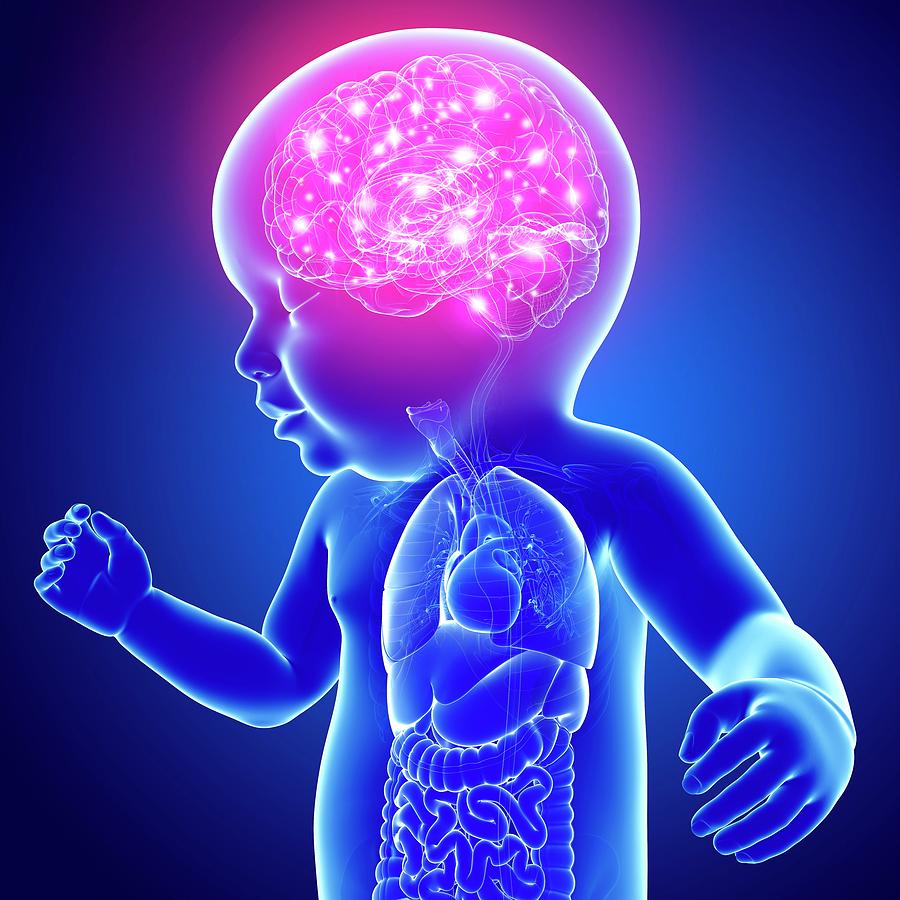From the moment a baby is born, their brain is constantly developing and changing. It is an amazing process, and as parents, we want to do everything we can to support our baby’s brain development. In this article, we will discuss how a baby’s brain develops and what we can do to help support our little one’s growth.
Table of Contents
Development of the Brain
A baby’s brain is not fully developed at birth. In fact, the brain is only about 25% of its adult size at that time. The brain develops rapidly in the first few years of life and continues to develop throughout childhood and adolescence.
The brain is made up of billions of neurons, which are specialized cells that transmit information. These neurons connect with each other to form networks, and these networks are responsible for all of the brain’s functions, from processing sensory information to controlling movement and emotions.
During the first few years of life, the brain goes through what is called a “critical period”. This is a time when the brain is particularly sensitive to input from the environment. The experiences that a baby has during this time can have a profound impact on their brain development and can shape the way their brain is wired for the rest of their life.
Factors that Influence Brain Development
There are many factors that can influence a baby’s brain development, including genetics, nutrition, and the environment. Let’s take a closer look at each of these factors.
Genetics
Genetics play a role in a baby’s brain development. Some babies may be born with certain genetic mutations that can affect their brain development. However, genetics are not the only factor that determines a baby’s brain development. Environmental factors also play a significant role.
Nutrition
Nutrition is critical for brain development. A baby’s brain needs certain nutrients, such as omega-3 fatty acids and iron, to develop properly. Breast milk is the best source of nutrition for a baby’s brain, but if a mother is unable to breastfeed, infant formula can provide the necessary nutrients.
Environment
The environment plays a significant role in a baby’s brain development. The experiences that a baby has early in life can shape the way their brain is wired for the rest of their life. Positive experiences, such as love, nurturing, and stimulation, can promote healthy brain development. Negative experiences, such as neglect, abuse, and trauma, can have a detrimental effect on a baby’s brain development.
How to Support Your Baby’s Brain Development
As parents, we want to do everything we can to support our baby’s brain development. Here are some tips to help promote healthy brain development:
Talk to Your Baby
Talking to your baby is one of the best things you can do to support their brain development. Even before they can understand what you are saying, talking to your baby helps to stimulate their brain and promotes language development. As your baby gets older, talking to them helps to build their vocabulary and helps them develop important social and emotional skills.
Play with Your Baby
Play is essential for healthy brain development. When you play with your baby, you are helping to stimulate their brain and promote the development of important skills, such as problem-solving, creativity, and social skills. Simple activities, such as playing peek-a-boo or singing nursery rhymes, can have a profound impact on your baby’s brain development.
Provide a Stimulating Environment
A stimulating environment can help to promote healthy brain development. Provide your baby with toys and other objects that stimulate their senses, such as rattles, mobiles, and soft toys. You can also create a safe space for your baby to explore, such as a playpen or a designated area of the living room.
Establish a Consistent Routine
Establishing a consistent routine can help to promote healthy brain development. Babies thrive on routine, and having a consistent schedule can help to promote a sense of security and stability. A consistent routine can also help your baby develop important self-regulation skills, such as sleeping and eating.
Conclusion
In conclusion, a baby’s brain is constantly developing and changing. It is an amazing process, and as parents, we want to do everything we can to support our baby’s brain development. By talking to your baby, playing with them, providing a stimulating environment, and establishing a consistent routine, you can help promote healthy brain development and set your little one up for a bright future.
 Source: bing.com
Source: bing.comFrequently Asked Questions
Q: When does a baby’s brain start developing?
A: A baby’s brain starts developing in the womb and continues to develop rapidly in the first few years of life.
Q: What can I do to support my baby’s brain development?
A: Talking to your baby, playing with them, providing a stimulating environment, and establishing a consistent routine can all help to support your baby’s brain development.
Q: Can genetics affect a baby’s brain development?
A: Yes, genetics can play a role in a baby’s brain development. However, environmental factors also play a significant role.
Q: What nutrients are important for a baby’s brain development?
A: Omega-3 fatty acids and iron are important nutrients for a baby’s brain development.
Q: How important is play for a baby’s brain development?
A: Play is essential for healthy brain development. When you play with your baby, you are helping to stimulate their brain and promote the development of important skills, such as problem-solving and creativity.
